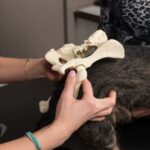
Contents
Pets, like humans, can experience emotional and physical distress after a traumatic event. Whether it’s an injury, a car accident, a fight with another animal, or exposure to a frightening situation (like a loud noise or natural disaster), pets can suffer from shock and stress. Just like physical wounds, emotional trauma requires care and attention to help your pet recover.
In this blog, we’ll explore how to help your pet recover after experiencing a traumatic event. We’ll discuss how to recognize shock and stress in pets, the best ways to manage them, and when it’s time to seek emergency care for pets.
Understanding Shock and Stress in Pets
Trauma can cause shock and stress, both of which require different forms of care. It’s important to understand the differences between these two reactions and how they affect your pet’s health.
- Shock is a physical condition that occurs when the body’s blood flow is reduced to vital organs. Shock can be life-threatening and is often caused by severe injury, trauma, or blood loss. When pets are in shock, their organs don’t receive enough oxygen and nutrients, which can cause organs to begin failing if not addressed quickly.
- Stress is a psychological response to trauma. Pets may show signs of stress due to fear, anxiety, or pain. Stress can manifest as physical symptoms like panting, shaking, or excessive grooming, or as behavioral changes like hiding or aggression.
Understanding how shock and stress affect your pet will help you provide the right support during their recovery.
Signs Your Pet is in Shock or Stress
It’s important to recognize when your pet is in shock or experiencing stress so you can take appropriate action. Symptoms of shock include:
- Pale or Blue Gums
One of the most common signs of shock is pale or blue-tinged gums. This is caused by a lack of oxygen in the bloodstream and requires immediate veterinary attention. - Rapid Heart Rate or Weak Pulse
Pets in shock may have a rapid or weak heartbeat. Their pulse may be hard to feel, especially if their blood pressure is very low. - Shallow, Rapid Breathing
Pets experiencing shock often breathe rapidly and shallowly. Their breathing may be irregular or labored. - Cold Limbs or Body Temperature
Pets in shock may have cold limbs or a low body temperature. This happens as blood flow is diverted away from the extremities to the vital organs. - Weakness or Collapse
A pet in shock may collapse or appear very weak, unable to stand or move properly. This is a critical sign that immediate care is needed.
Signs of stress in pets include:
- Panting or Excessive Salivation
Stress causes pets to pant excessively or drool more than usual. This is often a sign of anxiety or discomfort. - Trembling or Shaking
Physical shaking is a common stress response in pets, especially after a traumatic event. - Hiding or Avoiding Interaction
Stress can cause pets to withdraw from social interactions or retreat to dark, quiet places. They may avoid physical contact or hide under furniture. - Aggression or Acting Out
Some pets respond to stress by becoming aggressive, barking excessively, or biting. This could be a reaction to fear or pain. - Loss of Appetite or Drinking
Stress can lead to a decreased appetite or refusal to drink, which can result in dehydration. If your pet is refusing food or water after a traumatic event, it’s important to address it promptly.
What to Do to Help Your Pet Recover from Trauma
Once you’ve recognized that your pet is experiencing shock or stress, it’s time to take steps to help them recover. Here’s what you can do:
- Stay Calm and Keep Your Pet Calm
Pets are highly sensitive to their owners’ emotions, so it’s important to stay calm in order to reassure them. Speak softly and gently, offering comfort and support without overwhelming them. - Ensure Your Pet is Comfortable
Create a calm and quiet environment for your pet to recover in. If your pet is injured, make sure they are in a safe position and avoid moving them excessively. Use a soft blanket or towel to keep them comfortable, especially if they’re cold. - Provide Water and Food (If They’re Willing)
If your pet is able to drink and eat, offer them small amounts of water and a bland diet (such as boiled chicken and rice). If they’re refusing to eat, don’t force them; instead, monitor their hydration levels and keep offering fluids. - Control Bleeding and Provide First Aid
If your pet is physically injured, control any bleeding by applying pressure to the wound with a clean cloth. If the wound is large or deep, avoid touching it and get to a vet as quickly as possible. If your pet has suffered burns, use cool water to gently rinse the area. - Monitor Your Pet for Changes in Condition
Keep a close eye on your pet’s behavior and physical condition. If you notice signs of worsening shock (such as an increased heart rate or difficulty breathing), take your pet to an emergency pet clinic immediately. - Allow Rest and Recovery Time
After a traumatic event, your pet will likely need plenty of rest. Avoid excessive activity or stimulation, and allow your pet to relax and recover in a quiet area.
When to Seek Emergency Care for Pets
While some pets may recover from shock and stress with at-home care, others may require immediate medical attention. Seek emergency care for pets if:
- Your pet’s gums are pale or blue, indicating poor blood circulation.
- Your pet is experiencing labored or rapid breathing, or has a weak or irregular pulse.
- They are unable to stand, move, or seem unresponsive to you.
- Your pet has been severely injured or shows signs of internal bleeding.
- Your pet’s symptoms persist or worsen despite your efforts to help them.
- Your pet is not eating, drinking, or showing signs of recovery.
North MS Pet Emergency is here to provide expert care when your pet is experiencing shock, stress, or physical trauma. Whether your pet has been in an accident, has developed complications after surgery, or is recovering from emotional distress, our team is ready to offer the immediate care they need.
Contact Us Now for immediate care, or visit us for emergency pet care after hours.
Conclusion
Helping your pet recover from a traumatic event requires patience, attention, and a calm environment. Shock and stress are serious conditions that need proper care, and recognizing the symptoms early can improve the outcome for your pet. Whether your pet is dealing with physical injuries or emotional trauma, providing comfort, monitoring their recovery, and seeking immediate medical care when necessary is crucial to helping them get back to their normal, healthy self.
At North MS Pet Emergency, we are dedicated to offering urgent pet care for all types of emergencies, ensuring that your pet receives the care they need to heal physically and emotionally.




